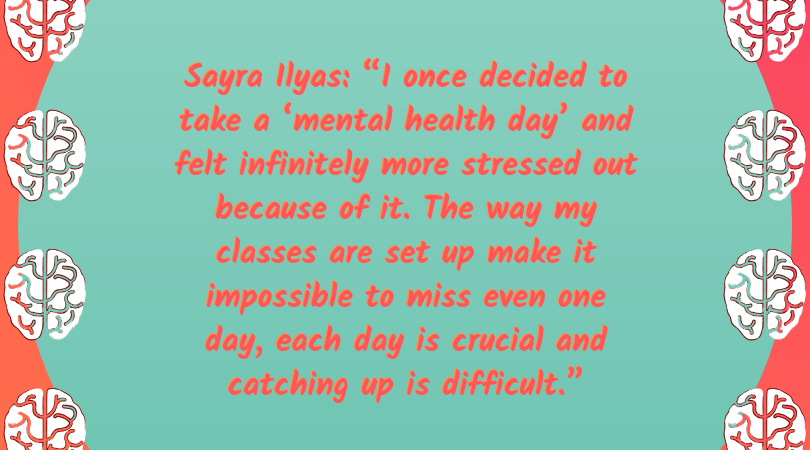The Vicious Cycle of Mental Health and Education
Words and graphics by Aspasia Celia Tsampas
Have you ever been encouraged to put your health beforeschool? Taken a mental health day? And then felt way more stressed and anxiousbecause of everything you missed?
You’re not alone. While we are moving toward a society that is aware of the struggles of Mental Health, we are still lacking in finding that balance between juggling Mental Health and a heavy course load. The internet has once again exposed our shortcomings on this aspect with a meme that went viral. It reads:
“Putting Mental Health before your education is great and all until it affects your education which affects your mental health which affects your education…”
You may be among the 500,000 people who have seen it, and ifyou haven’t you are most likely thinking about how relatable it really is. Butwhat is the truth behind this joke that resonates with students everywhere andwhat do we do to ensure this vicious cycle comes to an end?

According to a study conducted by the NationalAlliance on Mental Illness, 30% of students reported they struggled withschool work because of a mental health issue, 50% of students rated theirmental health below average, and 80% of students feel overwhelmed and stressedout in general by their responsibilities as a student. Yet, after all thesescary stats, 75% of students will never seek help. Mental health is the numberone cause of dropouts in college, suicide is the third leading cause of deathin students, yet the stigma around mental health in students is stilldangerously apparent.
For sophomore Victor LaLena, the stigma around mentalillness in school was a big prevention factor in seeking assistance, “I wasnervous to go to the school counselor or even talk to my professor about mystress and anxiety… I didn’t want to be put into some school database that maybe able to affect me negatively later on… I didn’t want to admit any weakness.”
This idea that admitting you struggle with mental health, orthat it is a “weakness” to be used against you, proves that simply puttingCCNY’s learning accessibility policy on the syllabus just is not enough. Victorstates, “Especially in New York City, everyone is striving to be perfect,appear perfect, and not only is it overwhelming for that person but it alsoaffects those around them.” Attending university in the city means sacrificingcollege parties for year-round internships, working full time as a student, oroverloading on credits.
The “Hustle Culture” in New York tells students that if theyare not giving 110%, they are failing. If everyone is striving for this senseof inherently unattainable “perfection,” how is anyone going to be able to takea step back and realize that the risks do not outweigh the benefits? The grindtruly does not stop.
Sayra Ilyas is a pre-med student at City College, goes toclass five days a week and volunteers at a hospital on the weekends. For her, takinga break is not an option: “I once decided to take a ‘mental health day’ andfelt infinitely more stressed out because of it. The way my classes are set upmake it impossible to miss even one day, each day is crucial and catching up isdifficult.”

Even if a student decided to take a “mental health day,” aform of “self-healing” that some have recently perpetuated, society needs torealize that mental health care is not a one-day process. It is long-term care;and rather than place it all on “self-help,” we should be focusing more on“community help.” This includes more understanding universities andstandardizing our mental health education, encouraging dialogue about mentalhealth, and empowering both students and professors with the knowledge theyneed.
Students need to be made aware that their “self-help” isonly as productive as they make it. This does not mean going through thisalone. “Self-help” is good in saying you are responsible for your own mentalhealth and wellness, and should not feed into the stigma, but can at timesenforce the notion of solitude in this process.
Reaching out is a form of “self-help” when you are doing itfor your own well-being. Take advantage of school counselors and accommodationservices. If taking a mental health leave from school is in the best interestfor your success, do not be afraid to do so, in the end, you are only harmingyourself by refusing your body and mind the care it requires. As forprofessors, ease student anxiety in the classroom. Students are more stressedout and working harder than ever before, become aware of the warning signs foranxiety, depression and other mental health concerns, validate a student’sfeelings when they come to you for help, be mindful of how you handle thesituation and how that affects the student’s academic ability as a whole.
Managing a mental health illness and other issues can bechallenging in college, but it does not have to be impossible. The viciouscycle of choosing between your mental health and education should not be a riskand benefit trade-off. It shouldn’t be a matter of putting one before theother, but rather working together to create an environment of healthy learningand advancement, even if that means destroying the stigma one meme at a time.




